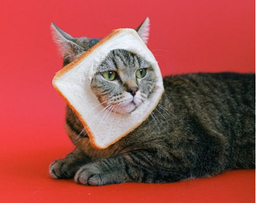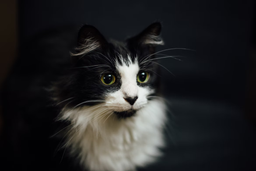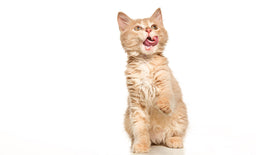Can cats eat mayo? An eggcellent question!
Mayonnaise is among the first things you give up when starting a diet, and for a good reason. The egg-based condiment is highly caloric and naturally high in cholesterol, so it’s not the best choice even for healthy people. Can cats eat mayo, or is it another disagreeable ingredient? Let’s learn more about feline nutrition and the effect mayonnaise can have on your furry friend’s health.
Can cats eat mayonnaise?
You can let your cat try mayonnaise, but don’t make it part of the standard diet. The condiment has a poor nutritional score. A 14-gram serving of commercially sold mayo has approximately 100 calories, 1.5 g of saturated fats, and 10 g of cholesterol.
Mayo also contains some potentially problematic ingredients. If you let your cat eat mayonnaise with their tuna every day, they are at risk of developing:
- Gastrointestinal problems
- Feline obesity
Gastrointestinal problems
Mayonnaise contains various ingredients that don’t agree with your cat’s stomach. Felines who have irritable bowel disease (IBS) or other chronic digestive problems are likely to experience vomiting, diarrhoea, and abdominal pain after eating a tiny amount. Even healthy cats can develop acute digestive issues if they have mayo every day.
But why is mayo so tough to digest? Let’s look at the most common ingredients in mayonnaise and see the effect they have on felines:
- Eggs—Cats can eat eggs without suffering indigestion, but that doesn’t mean they should do it regularly. Eggs are naturally high in cholesterol, which can cause gastrointestinal or heart diseases. Felines with high cholesterol often suffer from inflammation of the pancreas (pancreatitis) and bile duct obstruction (cholestasis)
- Lemon juice—The tropical fruit contains essential oils and citric acid that can cause acute digestive problems in felines. Some allergy-prone breeds, like the Siamese cat, can even develop dermatitis after brushing against a citrus rind
- Herbs and spices—Cats don’t need seasoning in their food. The feline stomach can be agitated by the herbs and spices in mayo, especially recipes that contain chives or garlic powder
- Artificial ingredients—Store-bought mayo contains preservatives, artificial flavouring, and other substances that could irritate your cat, particularly if they’re sensitive
Feline obesity

I’m out of the house, isn’t that exercise enough?
Source: Li Lin
Mayonnaise is extremely caloric, with a whopping 680 calories per 100 g! Your cat only needs 40 calories per kilo of their current body weight. For the average-sized adult cat, that adds up to approximately 250 calories per day. Some larger breeds, like Maine Coons or Ragdolls, require more, but mayo is too fattening even for the gentle giants.
A calorie surplus can lead to uncontrolled weight gain, especially in breeds with a genetic predisposition for obesity. Sadly, the most popular UK cats, such as the iconic British Shorthair, fall into that category. Even without a hereditary predisposition, indoor-only cats on a high-calorie diet are likely to put on weight.
Obesity can reduce your pet’s life expectancy since overweight cats are more likely to develop:
- Diabetes
- Heart disease
- Hypertension
- Osteoarthritis
- Urinary tract infections
If you often give your cat unconventional, high-calorie treats, like mayo, track their weight development using a comparative weight chart. You should also check where they stand on the body condition score.
Because of their predominantly sedentary lifestyle, indoor cats need to exercise. Encourage them to play at least 45 to 50 minutes per day. If you have a garden, let them run out to burn some calories.
What should cats eat?

All this talk is making me hungry.
Source: Kabo
Your cat doesn’t need mayo, ketchup, or any other condiment in their meals. What they need is:
- Animal protein
- Moisture
- Healthy fat
Protein is the foundation of the feline diet, enabling almost all vital functions—from muscle and tissue growth to immune resistance. Cats can only harness it from meat, meaning the protein in soya, whole grain, and other plant sources are nutritionally void.
Animal protein provides essential amino acids (taurine and arginine, for example) the cat’s body can’t produce but are vital for their eye, heart, and brain function.
How to make sure your pets get everything they need from their diet? Most vets agree that wet food is the best commercially produced substitute for fresh prey.
When compared with kibble, wet products are more hydrating and less caloric. Dry food is typically made with starchy vegetables and cereal, so it has limited biological value for felines. High-quality wet food is usually rich in animal protein and moisture.
Looking for healthy and delicious cat food? Get Untamed!
Untamed offers high-quality wet food that’s:
- High in protein—One serving of Untamed food has twice as much protein as the industry standard
- Made with whole meat—The meat cuts we use in our delicious recipes are of human-grade quality, packed with bioavailable nutrients
- Vet-formulated—Our meals were formulated in collaboration with vets to accommodate your pet’s unique biology
- Ethically produced—Untamed is a 100% Carbon Neutral Certified business! We make sure all our meat is sustainably farmed and only use recyclable packaging
- Impossible to resist—Your fussy cat will meow a different tune when they catch a whiff of our appetising meals
Long-term customers have noticed several health benefits of our natural feline diet. After a few weeks of eating Untamed, their cat’s appetite, eating habits, and physical appearance have significantly improved. According to the feedback from other members of our wild bunch, here’s a breakdown of the Untamed effect:
|
Timeline |
Health benefits |
|
Within a week |
|
|
After two months |
|
|
Within four months |
|
|
Life-long benefits |
|
Choose the perfect meal plan for your cat!

I like the smell of that!
Image (c) Untamed
Take our quick-and-easy online quiz, and choose the perfect meal plan for your cat! Tell us about their food preferences, sensitivities, and life stage, and we’ll help you design a diet specific to their needs.
Even if your pet is a picky eater who shies away from wet food, they won’t be able to resist our tasty and nutritious recipes. We make all our products with all-natural whole meat, including
- Chicken breast and liver
- Duck breast
- Salmon fillet
- Tuna steak
- Sardine and mackerel fillet
- Shrimp
The meat is gently simmered to retain its original bioavailability and freshness. Our food is ready-to-serve, so your cat can enjoy our delicacies the minute they arrive.
Explore our fine selection of gravy and jelly recipes and watch your cat go wild for our food:
|
Our menu |
Details |
|
Chocka Chicken in Jelly* |
Premium chicken breast dipped in mouth-watering jelly |
|
Chocka Chicken with Duck in Jelly |
Fresh chicken breast spiced up with delicious duck meat, served in jelly |
|
Chocka Chicken in Gravy* |
Shredded chicken breast simmered in natural gravy |
|
Chocka Chicken with Ham in Gravy |
Chicken breast with a bit of tasty ham simmered in chicken gravy |
|
Tuck-in Tuna in Jelly* |
Dolphin-safe tuna steak in jelly and appetising fish broth |
|
Tuck-in Tuna with Salmon in Jelly |
Tuna steak in jelly complemented with high-quality salmon fillet |
|
Tuck-in Tuna with Shrimp in Jelly |
Dolphin-safe tuna served in jelly with shrimp on the side |
*Tuck-in Tuna and Chocka Chicken are single-protein-source meals.

You don’t need mayo with Untamed’s Tuck-in Tuna. It’s perfect as is!
Image (c) Untamed
How to join the Untamed community
If you want to get monthly supplies of Untamed cat food with free shipping, sign up for a starter pack! Here’s how to join our wild bunch:
- Visit our Try Now page
- Tell us about your cat
- Pick a meal plan
- Place your order
Your first Untamed meal box will arrive at your door within a day. Once your cat checks out each dish and approves the selection, we’ll start sending you regular supplies of pre-portioned cat food.
If you ever wish to postpone your delivery or make any other changes to the initial order, let us know! We’ll go the extra mile to keep your cat happy and healthy.
Is mayonnaise dairy-free?
Mayonnaise is dairy-free, but some recipes use condensed milk instead of egg yolk as the main ingredient. The so-called maionese de leite (milk mayonnaise) is a famous Portuguese delicacy that’s slightly sweeter and lighter than regular mayo.
Since most felines have an innate lactose intolerance that prevents them from fully digesting dairy, milk mayonnaise is off-limits. Milk and most milk byproducts (except for tiny bites of yoghurt) can cause vomiting, diarrhoea, and other GI problems in kittens and full-grown cats.

You’re lucky I don’t like milk.
Source: Jurassic
What other human food can be harmful to cats?
Cats cannot and should not eat the following:
- Allium veggies—Allium plants contain oxidants that initiate the breakdown of red blood cells. Cats who eat onions, garlic, and even garlic powder as part of their daily meals can develop long-term or temporary anaemia and suffer kidney failure. Some breeds (e.g. Abyssinian and Bengal cat) are prone to PK deficiency—a hereditary condition where the feline’s red blood cells are destroyed at an abnormal rate—so they’re especially sensitive to allium veggies
- Grapes—Grape toxicosis is common among pets, particularly cats and dogs. The reason is still not determined, but it’s most likely a fungal toxin present in the fruit. Some nutritional experts suspect the root of the problem could be the tartaric acid present in both dried and fresh grapes. If felines consume the fruit regularly, they can experience acute kidney disease
- Caffeine—Caffeine contains methylxanthine that’s toxic to cats. The stimulative effects of the substance put a strain on their heart and cause caffeine poisoning. Your pet may experience vomiting and diarrhoea, hyperactivity, abnormal cardiac rhythm, muscle tremors, seizures, and even death. Methylxanthine is present in all caffeine-based foods and drinks, including tea, coffee, and chocolate (the lighter the chocolate, the lower the caffeine content)
- Alcohol—Cats cannot “hold their liquor” by any means. Depending on the average alcohol content, felines can experience mild to severe ethanol poisoning. A sip of light beer will make them groggy, but a tablespoon of spirits could give them a heart attack
Check out our other guides to what cats can or cannot eat:
|
|

![Best food for Ragdoll cats in the UK [Broken Down]](http://untamed.com/cdn/shop/articles/featured_best_food_for_ragdoll_cats_uk.jpg?v=1646818249&width=256)

